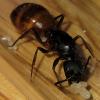I’ve been reading up on these guys since I caught 5 queens a couple of weeks ago. Here on the forum someone indicated that they were polygyny but everything I’ve read indicates that they are monogyn. Example https://core.ac.uk/d...f/147247892.pdf pg 5. Mississippi Entomological museum also listed them as monogyn. I do note that most of the sources indicate that there is not much written on the dark rover ant.
Does anyone here have personal experience with multi queen colonies? If so, we’re they multi queen from founding? I have the 5 in separate test tubes and am toying with combining them once they are established.
Any specific or generalized info on this species would be appreciated.
Edited by Tai_pan1, June 10 2022 - 1:52 PM.


















